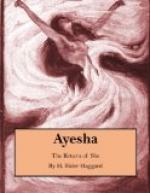Now I listened to these words—and none who did not hear them can guess the fearful bitterness with which they were spoken—expecting every moment that the Khan would draw the short sword at his side and cut the old man down. But he did not; he cowered before him like a dog before some savage master, the weight of whose whip he knows. Yes, answering nothing, he shrank into the corner and cowered there, while Simbri, taking Atene by the hand, went from the room. At its massive, iron-bound door he turned and pointing to the crouching figure with his staff, said—“Khan Rassen, I raised you up, and now I cast you down. Remember me when you lie dying—in blood and pain.”
Their footsteps died away, and the Khan crept from his corner, looking about him furtively.
“Have that Rat and the other gone?” he asked of us, wiping his damp brow with his sleeve; and I saw that fear had sobered him and that for awhile the madness had left his eyes.
I answered that they had gone.
“You think me a coward,” he went on passionately, “and it is true, I am afraid of him and her—as you, Yellow-beard, will be afraid when your turn comes. I tell you that they sapped my strength and crazed me with their drugged drink, making me the thing I am, for who can war against their wizardries? Look you now. Once I was a prince, the lord of half this land, noble of form and upright of heart, and I loved her accursed beauty as all must love it on whom she turns her eyes. And she turned them on me, she sought me in marriage; it was that old Rat who bore her message.
“So I stayed the great war and married the Khania and became the Khan; but better had it been for me if I had crept into her kitchen as a scullion, than into her chamber as a husband. For from the first she hated me, and the more I loved, the more she hated, till at our wedding feast she doctored me with that poison which made me loathe her, and thus divorced us; which made me mad also, eating into my brain like fire.”
“If she hated you so sorely, Khan,” I asked, “why did she not mix a stronger draught and have done with you?”
“Why? Because of policy, for I ruled half the land. Because it suited her also that I should live on, a thing to mock at, since while I was alive no other husband could be forced upon her by the people. For she is not a woman, she is a witch, who desires to live alone, or so I thought until to-night”—and he glowered at Leo.




